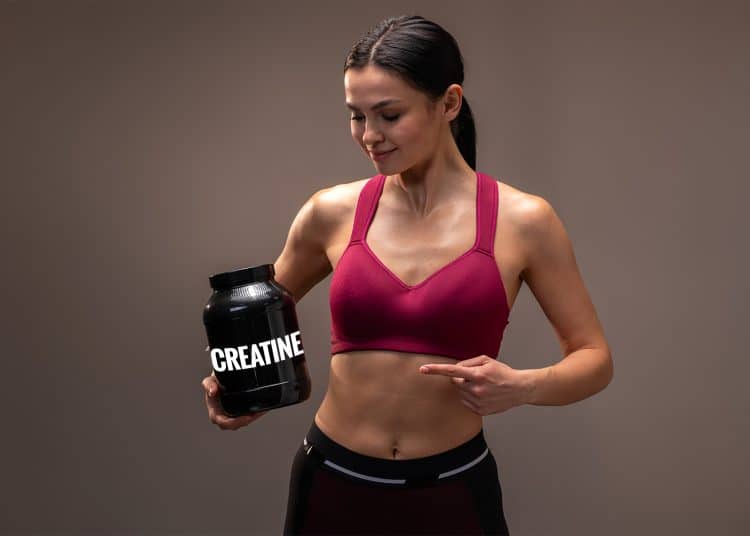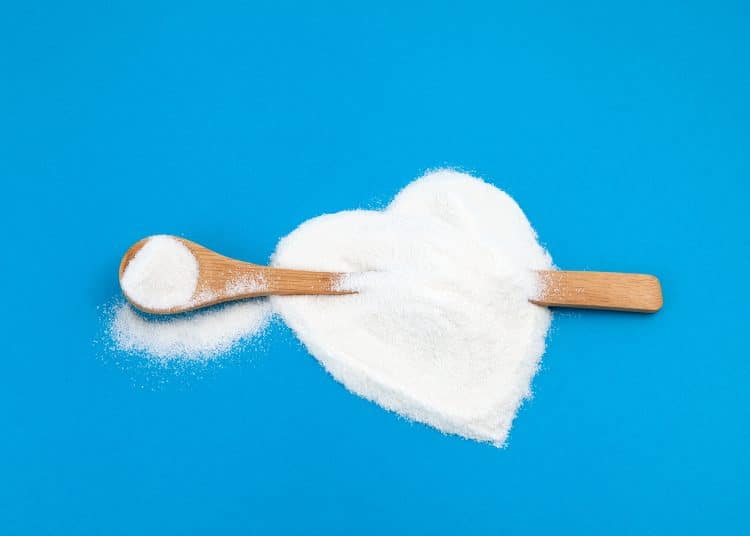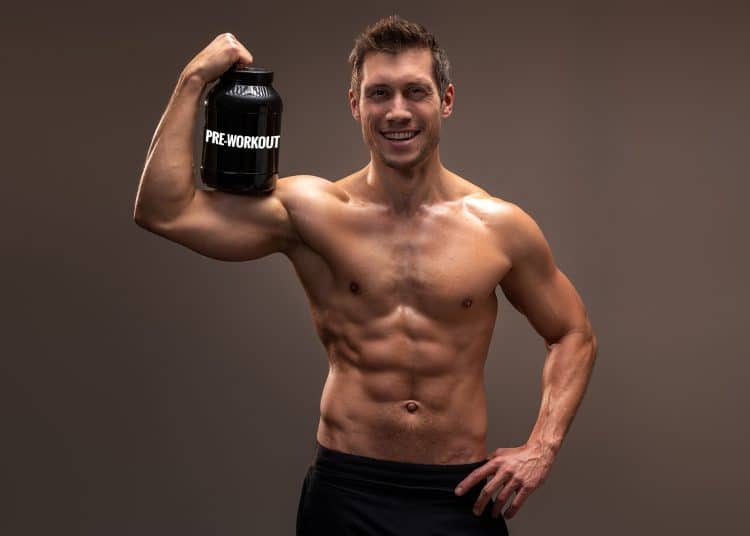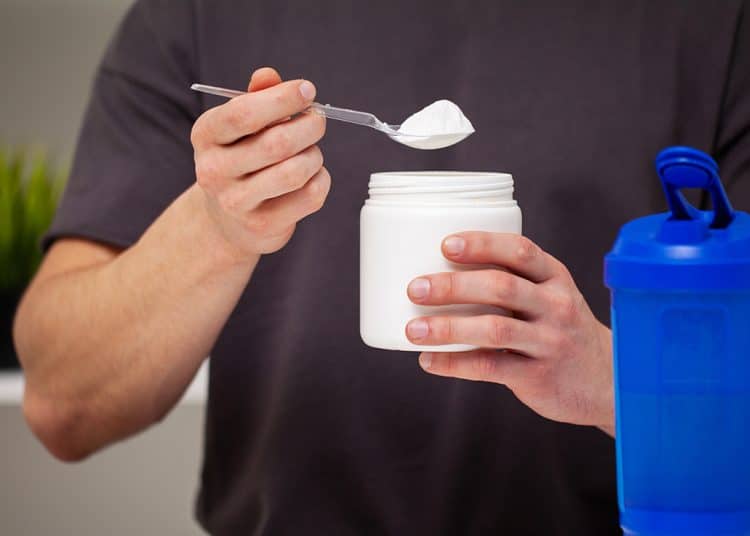With so much information available surrounding nutritional supplements today, it can be hard to decide which supplements are right for you.
Perhaps two of the most well-researched and scientifically-backed supplements are creatine and pre-workout.
But we often get asked about the differences between these two popular supplements, can they be taken together, and are the touted benefits actually true?
Read on to learn about the differences between creatine and pre-workout and if these supplements are right for you.
Creatine: What Is It and What Does It Do?

When you hear someone talk about creatine, you might think of bodybuilders who use it to put on massive amounts of muscle. You might also think that this supplement is only meant for serious bodybuilders. This couldn’t be further from the truth.
Before we get in depth about the benefits of creatine and why it’s not only meant for bodybuilders, it’s important to understand what creatine is and where it comes from.
Creatine is a natural substance that can be found in red meat and certain types of fish as well as in our own bodies.
Our body makes creatine on its own, but a creatine supplement can prove to provide more benefits than if you only relied on the body’s natural production of creatine.
What Are the Benefits of Creatine?
Being one of the most widely-studied supplements on the market and one of the most commercially-successful dietary products out there, creatine has many benefits that have been proven by scientific studies and reported by regular fitness enthusiasts who take it consistently.
Below are the main benefits that have been proven from taking creatine:
- Produces more energy for cells
- Improves high-intensity exercise performance
- Accelerates muscle growth
- Decreases recovery time
- May lower blood sugar
- Can improve cognitive function
Even with all these benefits, creatine is not a one size fits all supplement. There are several different types of creatine, and not all of them are recommended for regular use.
Types of Creatine
Creatine monohydrate
Creatine monohydrate is by far the most popular form of creatine that is available to consumers today.
There have been over 2,000 scientific studies on creatine and its effects, and nearly all of these studies were conducted by examining creatine monohydrate.
This form of creatine can be found in pill form or as a powder and is available in nearly all health stores.
So, what are the benefits of creatine monohydrate and why is it the most popular form of creatine on the market?
Creatine monohydrate has been proven to boost the effects of strength training to increase muscle mass while also being shown to improve endurance and performance in aerobic and anaerobic exercise.
Increasing muscle mass while reducing body fat is the primary goal of bodybuilders, athletes, and fitness enthusiasts alike. Since creatine has been shown to do all of these things, it’s no wonder that creatine monohydrate is perhaps the most widely-used and studied supplement on the market.

Related: Creatine Monohydrate Vs. HCL: What’s the Difference?
Creatine ethyl ester
Another type of creatine that is available on the market today is creatine ethyl ester.
This type of creatine is preferred by some because it can be consumed in smaller doses than creatine monohydrate. Creatine monohydrate is usually taken in doses of 20 grams or more, but creatine ethyl ester is dosed at just a couple grams each day.
However, there hasn’t been much testing on creatine ethyl ester to determine if it is safe to consume regularly
Creatine hydrochloride
Creatine hydrochloride is absorbed by the body about 60% better than creatine monohydrate.
It’s also been noted that creatine hydrochloride dissolves in water better than creatine monohydrate, which can make it easier to consume.
Because of this, you don’t have to consume as much creatine hydrochloride to get the same effect as creatine monohydrate.
While there haven’t been any public studies comparing the effects of creatine hydrochloride to that of creatine monohydrate, data collected by GNC on trained lifters has shown that creatine hydrochloride outperforms creatine monohydrate in terms of lean muscle mass gains and strength in the gym.
The other effects of creatine hydrochloride have not been studied and there is little research available today.
Liquid creatine
As you might have guessed, liquid creatine is creatine that is in liquid form as opposed to the traditional pills or powder. It comes in a small bottle of liquid that you can take with you instead of carrying bags of powder or pill bottles.
Manufacturers of liquid creatine claim that the creatine in liquid form is more easily absorbed by the body because it can go right to the muscles in liquid form.
However, there have been no studies that support these claims and liquid creatine is seldom used by members of the fitness community.
So Which Creatine Should I Take?
Because there are so many different types of creatine, this can make it difficult to decide which creatine supplement is right for you.
The International Society of Sports Nutrition found that creatine monohydrate is the best nutritional supplement that is available to athletes and fitness enthusiasts for increasing high-intensity exercise performance and improving lean body mass.
Most of the other types of creatine do not have much scientific studies to back them up, so using creatine monohydrate will be your safest option because of the evidence to support its effectiveness.
Are There Downsides to Creatine?
Although the benefits of creatine have been well-documented, there are certainly some downsides that anyone thinking of using creatine should be aware of before adding this supplement to their regimen.
The most widely reported downsides of creatine include:
- Bloating
- Increased water retention
- Stomach pain
It’s important to start with small amounts of creatine to see how your body reacts to these potential downsides.
Pre-workout: What Is It?

Now that you know everything about creatine, it’s time to examine pre-workout and its effects.
pre-workout is exactly as it sounds. It’s taken before your workout to increase energy levels to provide a more intense workout.
Taking pre-workout 15-20 minutes before going to the gym will improve your athletic performance and increase strength levels for resistance training.
Benefits of pre-workout
There are plenty of benefits to taking pre-workout, many which have scientific studies to prove them.
The benefits of pre-workout are:
- Increased energy
- Improved focus
- Increased strength
- Boost in athletic performance
- Muscle growth
What’s In a Pre-workout Supplement?
It’s important to read the label on pre-workout supplements to check if they contain a “proprietary blend” of ingredients.
Proprietary blends are a collection of ingredients that are listed on the labels of supplements. A proprietary blend does not list the exact amounts of each ingredient.
Instead, it lists the total amount of the proprietary blend which can be misleading, as you don’t know exactly how much of the active ingredients there are in the supplement.
When choosing a pre-workout, you want to be able to see exactly how much of each ingredient there is, so try to avoid supplements with proprietary blends.
While the ingredients in pre-workout can range from product to product, there are generally certain ingredients that most pre-workouts contain that you want to look for on the label of the supplement:
Caffeine

Many pre-workout supplements contain some type of stimulant to provide the extra energy that is needed when going to the gym to maximize your workout intensity.
This is why caffeine is the most common ingredient in pre-workout supplements.
The caffeine content in pre-workout supplements can range from the equivalent of 1 to 4 cups of coffee. If you are sensitive to caffeine, you should be careful when consuming pre-workout because too much caffeine can have negative side effects on its own.
Beta-alanine
Beta-alanine is another popular ingredient in many pre-workout supplements because it is touted to enhance athletic performance and endurance through exercise.
Part of the reason for the increase in popularity of beta-alanine is the way the supplement is marketed. It is often said to increase muscle building capacity while delaying the breakdown and fatigue of muscle tissue.
In addition to the physical benefits of beta-alanine, studies have shown that taking beta-alanine can also improve cognitive function and an increased resilience to stress.
Branched-chain amino acids (BCAAs)
Branched-chain amino acids include leucine, isoleucine, and valine and are supposed to increase muscle growth, decrease soreness after exercise, and reduce muscle fatigue following exercise.
The multi-million dollar industry promoting BCAAs claim these benefits, however studies have not definitively proven these claims.
In fact, an extensive search of literature on BCAAs hasn’t shown any quantifiable muscle protein synthesis response in subjects taking BCAAs.
Are There Any Downsides to Pre-workout Supplements?
With all the benefits that come with pre-workouts, there are unfortunately some downsides that it’s important to be aware of before investing in a pre-workout supplement.
The most reported downsides to pre-workout supplements are:
- Jitters from excess caffeine
- Dehydration
- Insomnia
- Increased blood pressure
- Addiction to the stimulant in pre-workout
Creatine vs. pre-workout: Can They Be Taken Together?
Another ingredient that many pre-workout supplements contain is in fact creatine.
Because pre-workout is typically not taken each day like creatine, it is recommended to take creatine and pre-workout separately in order to reap the maximum benefits of each supplement.
Taking these two supplements on their own has been shown to dramatically increase strength in the gym.
How to Take Creatine and Pre-workout

Pre-workout
Taking pre-workout is fairly simple and doesn’t require much preparation.
The best way to take any supplement is to follow the directions on the bottle, but generally you will take a scoop of the pre-workout powder and mix it with enough water so it dissolves completely.
If you drink the pre-workout all at once, you may feel the effects of the stimulant quicker, so be careful when consuming your pre-workout quickly and always test with a small amount at first to gauge your sensitivity to its active ingredients.
Creatine
Taking creatine depends on the type of creatine that you are consuming. As we mentioned previously, creatine monohydrate has the most proven benefits, and we recommend consuming it in powder form over the pill.
Mixing the creatine powder with water or adding it to hot beverages such as coffee or tea is a great and easy way to consume creatine.
Studies have shown mixed reviews on the time of day that creatine should be consumed, but generally speaking, creatine is safe to consume at any time of day that is convenient for you.
Best Pre-workouts:
- Best Pre-Workout Supplements of 2023
- Best Pre-Workouts Without Creatine
- Best Thermogenic Pre-Workouts for Fat Loss
- Best All-Natural Pre-Workouts Reviewed
- Best Organic Pre-Workout Supplements
- Best Vegan Pre-Workout Supplements
- Best Pre-Workout Supplements for Weight Loss
- Best Strongest Pre-Workout Supplements
- Best Tasting Pre-Workout Supplements
Learn more about Pre-workouts:
- Does Pre-Workout Make You Gain Weight?
- Does Pre-Workout Go Bad?
- Why Does Pre-Workout Make You Itch?
- How Long Does Pre-Workout Last?
- How to Make Your Own Pre-Workout Drink
Learn more about Creatine:
- Creatine Monohydrate Vs. HCL
- Creatine Ethyl Ester Vs Creatine Monohydrate
- Is Creatine Bad for You?
- How To Load Creatine For Faster Muscle and Strength Gains
- Why Creatine Supplementation is Good For Any Lifter
- The Facts of Creatine
- Creatine Cycling: Is It Necessary?
The Bottom-line
Creatine and pre-workout supplements have been widely studied and have well-documented benefits that can be very useful for fitness enthusiasts.
Taking these two supplements can have a dramatic effect on athletic performance and muscle building ability when combined with a proper diet and exercise program.
It’s important to do as much research as possible before taking any type of supplement and always consult a doctor before beginning any exercise program.
Be sure to check out all of our nutritional resources and product reviews on our website!
References:
- Journal of the International Society of Sports Nutrition: International Society of Sports Nutrition position stand: creatine supplementation and exercise https://www.ncbi.nlm.nih.gov/pmc/articles/PMC2048496/
- Healthline: Top 6 Types of Creatine Reviewed https://www.healthline.com/nutrition/types-of-creatine
- Healthline: 5 Reasons Why Creatine Monohydrate Is the Best https://www.healthline.com/nutrition/creatine-monohydrate-is-best
- PubMed: The effects of pre versus post workout supplementation of creatine monohydrate on body composition and strength https://pubmed.ncbi.nlm.nih.gov/23919405/
- Medical News Today: Should I use creatine supplements? https://www.medicalnewstoday.com/articles/263269
- PubMed: Creatine and creatine forms intended for sports nutrition https://pubmed.ncbi.nlm.nih.gov/28019093/
- BMC: The effect of acute pre-workout supplementation on power and strength performance https://jissn.biomedcentral.com/articles/10.1186/s12970-016-0138-7
- WebMD: Health Benefits of Pre-Workout Supplements https://www.webmd.com/fitness-exercise/health-benefits-pre-workout-supplements#1
- WebMD: Beta-alanine https://www.webmd.com/vitamins-and-supplements/beta-alanine-uses-and-risks
- PubMed: Effects of β-Alanine Supplementation on Carnosine Elevation and Physiological Performance
https://pubmed.ncbi.nlm.nih.gov/29555069/ - Healthline: 5 Proven Benefits of BCAAs (Branched-Chain Amino Acids) https://www.healthline.com/nutrition/benefits-of-bcaa
- PubMed: Branched-chain amino acids and muscle protein synthesis in humans: myth or reality? https://pubmed.ncbi.nlm.nih.gov/28852372/
- PubMed: Effects of acute ingestion of a pre-workout dietary supplement with and without p- synephrine on resting energy expenditure, cognitive function and exercise performance: https://pubmed.ncbi.nlm.nih.gov/28096758/
- Healthline: 10 Health and Performance Benefits of Creatine https://www.healthline.com/nutrition/10-benefits-of-creatine


